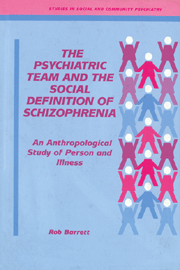 The Psychiatric Team and the Social Definition of Schizophrenia
The Psychiatric Team and the Social Definition of Schizophrenia Book contents
- Frontmatter
- Dedication
- Contents
- Foreword
- Preface
- Acknowledgements
- 1 Schizophrenia in Context
- 2 Time and Space in a Progressive Psychiatric Hospital
- 3 Professional Domains and the Dimensions of a Case
- 4 Clinical Teams and the ‘Whole Person’
- 5 Documenting a Case: The Written Construction of Schizophrenia
- 6 Moral Trajectories: From Acute Psychosis to ‘Chronic Schizophrenic’
- 7 Historical Formulations of Schizophrenia: Degeneration and Disintegration
- 8 Contemporary Formulations of Schizophrenia: Explaining the Inexplicable
- 9 Schizophrenia for Practical Purposes
- 10 The Person, the Case, and Schizophrenia
- References
- Index
4 - Clinical Teams and the ‘Whole Person’
Published online by Cambridge University Press: 05 August 2016
- Frontmatter
- Dedication
- Contents
- Foreword
- Preface
- Acknowledgements
- 1 Schizophrenia in Context
- 2 Time and Space in a Progressive Psychiatric Hospital
- 3 Professional Domains and the Dimensions of a Case
- 4 Clinical Teams and the ‘Whole Person’
- 5 Documenting a Case: The Written Construction of Schizophrenia
- 6 Moral Trajectories: From Acute Psychosis to ‘Chronic Schizophrenic’
- 7 Historical Formulations of Schizophrenia: Degeneration and Disintegration
- 8 Contemporary Formulations of Schizophrenia: Explaining the Inexplicable
- 9 Schizophrenia for Practical Purposes
- 10 The Person, the Case, and Schizophrenia
- References
- Index
Summary
I have examined the division of psychiatric labour and the assertion of distinctiveness among the mental health professions as they jostled for autonomy and power, resulting in a hospital characterized by organizational schism and, at the level of case formulation, a fragmented construction of the person. Running counter to this schism was the integration of mental health professionals into multidisciplinary teams. The psychiatric hospital was thus characterized by theme and countertheme—the rhetoric of professional autonomy versus the rhetoric of team work. Each demanded the other in the same way that parts demand a whole but a whole also demands its parts. The division of labour was in keeping with ideas of psychiatric treatment as a technical practice, where efficiency was enhanced by specialization and differentiation. Teams, on the other hand, were an expression of psychiatry's claim to be a humanistic enterprise, to treat people as individuals. Only a team, it was said, could treat the ‘whole person’.
At Ridgehaven Hospital the staff were enthusiastic about teams as a means of engaging their personal involvement. Teams were a channel for individual commitment in a large organization where alienation and disenchantment might have otherwise prevailed. The staff often characterized the hospital as a bureaucracy in the pejorative sense of red tape, referring to the rules that blocked personal initiative and to the imperative to document everything they did. Alienation from the hospital was countered by commitment to a team. Whereas the hospital was large, the team was small. If the hospital was impersonal and rank-ridden, with titles as the preferred mode of address ('Dr So and So’), fellow team members called each other by their first names. Whereas the hospital had rules that governed and restricted, the team had a 'spirit’ which encouraged involvement and initiative.
With few exceptions (see Moffic et al. 1984:63), the psychiatric literature in this area merely endorses the perceived benefits that flow from teams, these being organizational integration for the hospital and a feeling of personal involvement for individual staff members. These benefits are extolled with a degree of enthusiasm and reverence that betrays a commitment to team values rather than a capacity for critical analysis (see, for example, Bowen, Maler, and Androes 1965).
- Type
- Chapter
- Information
- The Psychiatric Team and the Social Definition of SchizophreniaAn Anthropological Study of Person and Illness, pp. 71 - 106Publisher: Cambridge University PressPrint publication year: 1996
